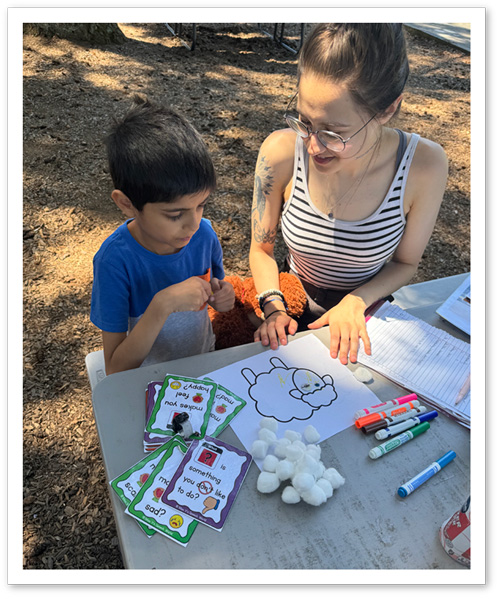Our Mission
The mission of APEX Summer Camp is to provide an evidence-based, neurodiverse-affirming summer program designed specifically for children with ASD and other neurodevelopmental disabilities. We utilize a naturalistic camp environment to focus on building social skills, positive relationships, and self-esteem within the context of structured recreational and learning activities. We engage leading experts to provide clinical training, supervision, support, and consultation for our program. The UW Autism Center’s summer day camp program aims to provide a structured, data-based, and individualized program for campers. It also aims to train and engage emerging professionals in the field of evidence-based behavioral intervention.
Philosophy
 Our philosophy reflects naturalistic environments offer the best opportunities for learning and generalizing meaningful skills across multiple settings (home, school, social activities). Our program utilizes common, age-appropriate recreational activities including game play (board games, table top games, arts and crafts, sports activities and others) that provide opportunities for kids to engage with each other and build friendships. Additionally, the APEX program is highly structured to maximize learning opportunities and to provide consistency and predictability for our campers.
Our philosophy reflects naturalistic environments offer the best opportunities for learning and generalizing meaningful skills across multiple settings (home, school, social activities). Our program utilizes common, age-appropriate recreational activities including game play (board games, table top games, arts and crafts, sports activities and others) that provide opportunities for kids to engage with each other and build friendships. Additionally, the APEX program is highly structured to maximize learning opportunities and to provide consistency and predictability for our campers.
We introduce new skills through direct teaching and explicit rehearsal with practice throughout the day. Behavioral data are collected during all activities, providing data-based progress monitoring. We utilize positive reinforcement and genuine, warm relationship building to support prosocial behavior, accompanied by direct prompting and feedback, as appropriate. Parent partnerships are essential, assisting in the identification of target skills and facilitating growth across environments.
Program Design
The camp program is designed to build and practice social skills and self-esteem within the context of structured recreational and learning activities. Children participate in typical camp activities including board games, table top games, arts and crafts, sports activities and others. We introduce new skills through direct teaching, explicit rehearsal including modeling and role-playing, with practice and reinforcement throughout the day and across activities. Explicit social skills instruction will be provided using evidence-based programs to support reciprocal conversations and friendship skills. Targets of treatment include improvements in the quality of peer interactions, increases in self-efficacy and confidence, and enhanced self-regulation of emotions and behavior. The program offers 115 hours of treatment in 4 weeks, roughly the equivalent of a year and a half of clinic or school-based social skills training.
The program includes the implementation of a reward system in which children earn points for appropriate behavior, such as helping peers, staying on task, following rules, and appropriate social interaction (e.g. maintaining personal space, initiating social approaches, appropriate questions). Point accumulation entitles children to rewards on a daily and weekly basis. Data tracking proceeds continuously throughout camp, with individual progress monitoring occurring on a daily and weekly basis. Daily report cards are sent home to parents to provide feedback to the child and parent regarding daily and weekly performance. Expert clinical supervision occurs weekly, with individualized intervention programs implemented and modified accordingly.
